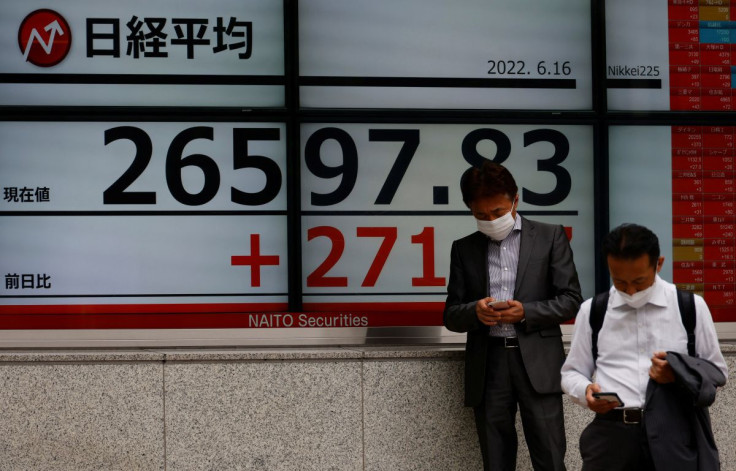Stocks Temper Their Inflation Expectations On Copper Pounding

World stocks headed for their first weekly gain in a month and Wall Street was set to open higher on Friday on hopes that slides in copper and other commodities could put a brake on runaway inflation.
The week has been marked by steep declines for commodities on concern that the world economy is looking shaky and that interest rate hikes will hurt growth - which in turn is prompting traders to cut inflation expectations and pare back some bets on the size of the hikes.
"Inflation will remain elevated and above target but it's increasingly likely it will start to peak over the next few months," Andrew Hardy, investment manager at Momentum Global Investment Management, said.
"Markets could take that reasonably well - there's potential for recovery later in the year."
U.S. S&P futures rose 0.9% and MSCI's world equities index was up 0.5% on the day and 2.5% on the week, setting it up for the first weekly gain since May. [.N]
Copper, a bellwether for economic output with its wide range of industrial and construction uses, is heading for its steepest weekly drop since March 2020. It fell in London and Shanghai on Friday and is down more than 7% on the week.
Tin fell by almost 15% on Friday, taking losses this week to a record 25%, as investors fear that slowing economic growth will reduce demand for the metal used in solder for electronics.
Brent crude futures rose more than $1 to $111.28 a barrel on Friday but remain down 2% on the week and 10%
on the month, while benchmark grain prices sank, with Chicago wheat off more than 8% for the week. [O/R][GRA/]
Gold was up 0.2% at $1,826.30 per ounce but was heading for a second straight weekly fall.
The price drops have offered some relief to equities, since energy and food have been the drivers of inflation.
European stocks jumped 1.5%, on course to post small weekly gains. Britain's FTSE rose 1.3%, also showing a small uptick on the week.
"For long-term investors, the story has not changed - falling markets offer more attractive valuations on high quality companies with a competitive edge," Lewis Grant, senior portfolio manager for global equities at Federated Hermes, said.
The Federal Reserve's commitment to reining in 40-year-high inflation is "unconditional," U.S. central bank chief Jerome Powell told lawmakers on Thursday, while acknowledging that sharply higher interest rates may push up unemployment.
Germany is heading for a gas shortage if Russian gas supplies remain as low as they are now due to the Ukraine conflict, and certain industries would have to be shut down if there is not enough come winter, Economy Minister Robert Habeck told Der Spiegel magazine on Friday.
Ukraine said Russian forces had "fully occupied" a town south of the strategically important city of Lysychansk in the eastern Luhansk region as of Friday.
Bonds rallied hard on hopes that bets on aggressive rate hikes would have to be curtailed, with German two-year yields sliding 26 basis points on Thursday in their biggest drop since 2008.
The German 10-year yield was down 4 bps on Friday after slumping 29 bps on Thursday, and was heading for its first weekly drop since mid-May. [GVD/EUR]
The benchmark 10-year Treasury yield gained 4 bps to 3.1076%, however, after falling 7 bps on Thursday [US/]
Bond funds suffered their largest outflows since April 2020 in the week to Wednesday while equities lost $16.8 billion as markets were stuck in maximum bearish mode, BofA's weekly analysis of flows showed on Friday.
The U.S. dollar has slipped from last week's 20-year highs. The euro gained 0.23% to $1.05470 and the U.S. currency was flat at 135.03 yen. [FRX/]
The battered yen has steadied this week and drew a little support on Friday from Japanese inflation topping the Bank of Japan's 2% target for a second straight month, putting more pressure on its ultra-easy policy stance.
MSCI's broadest index of Asia-Pacific shares outside Japan rose 1.1%, helped by short sellers' bailing out of Alibaba - which rose nearly 6% - amid hints that China's technology crackdown is abating.
Japan's Nikkei rose 1.2% for a 2% weekly gain.
© Copyright Thomson Reuters 2024. All rights reserved.




















